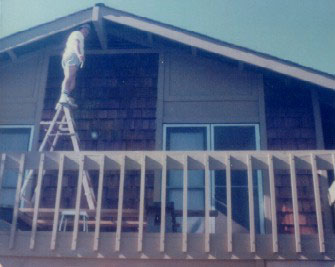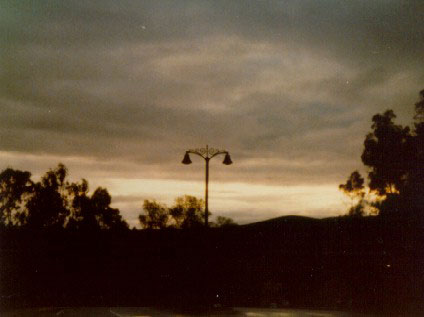One of my students commented in his blog that he’d just had a relaxing weekend, noting that he’d actually had time to do some yard work with his wife and how much better the experience was versus the typical weekend of continuous running around. Interesting. As I continue my own house-hunting adventure I wonder how this change from life-long renter to first-time buyer will change my own disposition towards a “relaxing weekend doing yard work.” In a Pepperdine assignment on mentoring for my Masters degree I’ve already gone on record writing that I’ve already done my time doing yard work as a child and adolescent. Maybe that’ll change. maybe not. Here’s the Pepperdine essay:
Mentoring Analysis – The Benefit of Learning By Example

dad workin
I can’t believe how my brother betrayed me. There he was, just rambling on, completely oblivious to the betrayal. I can’t believe he’d forgotten the vows we’d made during those numberless sweaty Saturdays out in the backyard under the heartless afternoon sun as our father rained down on us pruned branches to be cut and dissatisfaction at our efforts.
I thought that it was understood that once we’d successfully escaped our father’s unsatisfiable tutelage that we’d never ever again spend another day toiling under the sun, pruning trees, or doing anything beyond the minimum necessary to keep the lawn from over-growing and swallowing up the patio furniture. But there he was proudly displaying his garden and the huge ears of corn he was expecting in a few weeks. Damn. I guess new homeownership does that to a person.
Okay, so not everyone takes the vows of teenage-boys seriously (brother!), and it wasn’t exactly the “Grapes of Wrath.” But it was negative enough to leave the above “not-so-fond” memory. Let’s just say, when I began to read Shea and recalled the nurturing/supportive characteristics we all agreed a mentor should have, my father silently slipped off the list . . . at first.
Based on Gordan Shea’s list of twenty characteristics about “What Mentors Do” (p.14) my father exhibited eight of the twenty characteristics (usually having to do with doing the job right, and his quotable quote was, “Can’t you guys do anything right?!,” so I wasn’t sure whether I should count that one). Of the twenty-two characteristics (see below) that we cooked up in Colorado his numbers dropped to just two. Actually, this whole business of going back and mining my memory for mentoring moments and/or relationships was getting pretty depressing for me. As I worked my way through my list there was an obvious pattern of learning from a distance so as not to get too close to whichever leader (and suffer from his/her potential wrath). It’s pretty clear where that pattern came from.
It was many years later in the middle of one of my child-development classes, when we were discussing the Characteristics of Play, that it suddenly dawned on me that my father’s endless weekends of yardwork was his form of leisure. It was his form of play. Of course, none of this had made sense to my brother and I as kids because this was anything but fun to us. But to my father the “work” meant a great deal to him and having us there to “share” it with him also meant a great deal (even though we were anything but receptive to any message at the time). And even odder still was that he worked in landscaping and spent his whole week doing pretty much the same things for a living. The only difference, on the surface, between his work-a-day world and what he did on the weekends he was working on his yard with his boys. But at the time we never saw it.
In one of last term’s readings Frank Smith made it clear that learning happens whether we want it to or not, more from the people we’re around than from the words of teachers.
“We learn from the people around us with whom we identify. We can’t help learning from them, and we learn without knowing that we are learning.” Frank Smith. The Book of Learning and Forgetting, 1998, p.3
So when I look at the person I’ve become and look at the long hours that I put in and the high expectation that I have for myself and the work that I do, I now know where those values came from. Those were values that were important to him, values that saw him through the early years of his own life when he didn’t have a father to lead him. And just as he never looked at the difficulties of his own up-bring for an apology for not having had a “perfect childhood,” I don’t expect or want an apology from him for the often vitriolic relationship that we had as father and son. I understand that he was just being a man, a man true to his core values and those values didn’t always translate well to squirrely seven- and ten-year-old boys.
 Dear ol’ dad, whatever his conscious intentions may have been (prune trees, cut branches down small enough to fit into trash cans), he taught my brother and I a great deal more than the “joys” of working with small hand tools on mountains of orange and olive tree branches. I love him for instilling those values in me. But I’m still not going to pick up any pruning shears anytime soon. I’ll leave that to my silly younger brother. JBB (Spring 2002)
Dear ol’ dad, whatever his conscious intentions may have been (prune trees, cut branches down small enough to fit into trash cans), he taught my brother and I a great deal more than the “joys” of working with small hand tools on mountains of orange and olive tree branches. I love him for instilling those values in me. But I’m still not going to pick up any pruning shears anytime soon. I’ll leave that to my silly younger brother. JBB (Spring 2002)
NOTES:
Colorado List of Mentor Characteristics:
trust
honesty
respect
clarity
non judgmental
guidance
empathy
dialogue
mutual benefit
sense of humor
compassion
availability
willingness to negotiate
personable
supportive
caring
intuitive
respectful
visionary
lead by example
interpersonal skills












